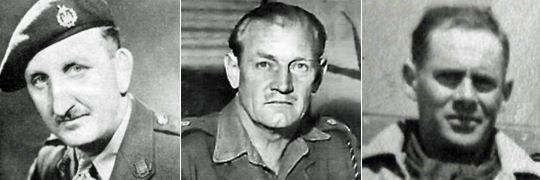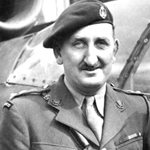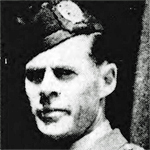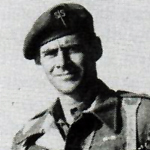2 Commando Commanders
This history of No. 2 Commando was compiled at the request of The Commando Veterans Association, who wanted a record of the unit’s activities and first-hand recollections of its members as seen through the eyes of a No. 2 Commando veteran. There was a certain urgency about the request because this veteran, turned author, is old and just about one step away from the knacker’s yard. There is much to tell about the No. 2 Family and its Father, Charlie Newman.
Bob Bishop
Read more about each Commanding Officer below.
Continue reading our history of No 2 Commando here 'Some of the Men'.
NEWMAN, Lt Col. Augustus Charles, VC
Clap hands! - Good Old Charlie!
Clap hands! - Here’s Our Charlie now!!
NEWMAN, Lt Col. Augustus Charles, VC, (OC No.2 Cdo), London Gazette
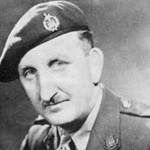
The Citation for the award of the Victoria Cross to Lt Col A.C. Newman The Essex Regt No 2 Commando and Commander of the land forces St Nazaire raid 27/28th March 1942.
Follow this link to learn more about all the Commandos awarded the Victoria Cross
CHURCHILL, John Malcolm Thorpe Fleming (Lt Col)
After a brief spell as 2i/c No 5 Commando, the then Major John Malcolm Thorpe Fleming Churchill (later affectionately known by some as Mad Jack) moved to 2i/c No 3 Commando. Wounded during Operation Archery at Vaagso 27 December 1941.
On the 1st July 1942 the now Lieutenant Colonel 'Jack' Churchill M.C. was appointed commanding officer of No. 2 Commando joining them on 3rd July 1942*, their previous OC, Lt Col Newman [more...] , having been taken prisoner of war at St Nazaire. Lieutenant Colonel Churchill remained OC until he was also taken prisoner during Operation Flounced on the island of Brac in 1944.
*No. 2 Commando War Diary July 1942 and Field Returns of Officers in WD (incl. Dec43).
An account by Bob Bishop No 2 Commando from his history of No 2:
"It has been over sixty-three years since this author served under the command of Jack, but to this day it is impossible to think of the man without prefacing my reverie with some kind of exclamation such as: Whew! or My God! and I have to stop thinking about this larger-than-life character or else I wouldn’t get anything done during the day or sometimes, night. Jack will always be with me because he will be part of my life; something that will last and never fade.
Unlike so many of the men he commanded, Jack came from a pretty well-heeled Oxfordshire family. Following his formal education at the Dragon School, Oxford and King William’s College, Isle of Man, then RMC Sandhurst, he obtained a regular army commission in the Manchester Regiment in 1926. His career in the peacetime army came to a screeching halt ten years later when Jack and his C.O. agreed to disagree and Jack resigned his commission.
Jack was recalled to the army at the outbreak of war, served with distinction at Dunkirk and got himself an M.C. After which, he was one of the very first volunteers for the newly-formed Commandos. Jack found himself assigned as Major, and second-in-command of No. 3 Commando. The author wonders about that time. The thought of having three diverse personalities and future Commando legends – John Durnford Slater, Peter Young and Jack Churchill – all under the same roof is frightening! However, it all worked out well – J.D.S. was kicked upstairs, promoted to Brigadier, Peter Young eventually got control of No. 3 Commando, and Jack Churchill was shifted over to No. 2 Commando replacing Lt. Col. Charlie Newman, who had been lost at St. Nazaire.
The ‘coming’ of Jack to No. 2 Commando in 1942 and his subsequent campaign exploits are related elsewhere. In this narrative, the author confines himself to relating his memories of Jack and endeavors to try to convey some truths that need to be recorded and questions that need to be asked now, or they will never see daylight.
This author finds himself somewhat dismayed by various reports that have surfaced from time-to-time which infer that Jack Churchill was a sort of ‘publicity seeker’. For those who have that opinion, I ask them to consider this:
Where is there a book written by Jack Churchill concerning No. 2 Commando depicting himself in a starring role?
Jack has never written anything about his life and times, or caused them to be recounted by some ghost-writer. Thankfully no officer who served in No. 2 Commando has ever caused publication of a book to join the many which were authorized by Jack’s brother-colonels in other Commando units and several accounts written by lieutenants on upwards. The author makes this point, not in criticism of these many published scribes, but to illustrate that Jack certainly had a personal story of unexcelled heroism to tell, but was too darn modest to cash in on it.
There is that matter of a decoration. At Salerno Jack and his runner had operated far out ahead of the Commando and entered the enemy-held village of Pigoletti, whereupon Jack descended on each German sentry post or weapons pit, made its occupants prisoner and delivered them group by group to be guarded by the waiting runner. When the count was made it amounted to 42 prisoners Jack had taken. He even made the German mortar crews carry out their own mortars. The prisoners with all their weapons were then handed over to the leading Commando troop when it finally caught up with Jack. For this audacious feat of arms Col. Jack was recommended for the Victoria Cross, which was in due course watered down to a D.S.O. WHY? The award of the V.C. had certainly been made as a result of actions concerning far-lesser valour.
The qualities of leadership displayed by Jack’s fellow Commando colonels, Lt. Cols. Durnford Slater, Peter Young, Derek Mills-Roberts, Lord Lovat and Ronnie Tod, were all recognized by their promotion to the rank of Brigadier. They were all grand leaders who deserved such recognition. BUT Jack was not promoted. In fact, we have to sadly note that in 1948 he had been demoted to the rank of major engaged in the thankless task of keeping Arabs and Jews from each others throats in the Palestine mandate. It is thought that Jack had fully deserved the promotion which was awarded to his peers, but somehow denied to him. WHY? again.
It is said by many fanciful writers that Jack went into action in No. 2 Commando ‘resplendent with bow and arrows’. Where? The author participated in everyone of the Colonel’s operations in No. 2 and only saw our Jack adorned with claymore, bagpipes, an American M-1 carbine, sometimes a 45 automatic, haversack, helmet with large S.S. badge, and map case. Wasn’t that enough?
Jack much admired the discipline and enthusiasm of the average German soldier. He once stated ‘that was what made them such wonderful soldiers’. He compared such qualities rather favourably with those who inhabited our ‘mass-produced army’. He always advocated more realistic training for the ordinary British soldier although he fully realized that it would be impossible to put the whole army through Achnacarry.
Jack, the man, was hard, if not impossible, to get to know. He lacked a certain rapport with his brother-officers and certainly never got close to the rank and file boys in the same way as Charlie Newman. But, then again, Charlie Newman’s fatherly attitude was a tough act to follow and Jack Churchill’s pale, steely-blue eyes were fixed on the prosecution of the war and nothing else.
Our ‘Mad Jack’ once gave himself to prose, writing that:
"No Prince or Lord has tomb so proud
As he whose flag becomes his shroud"
Lt. Col. J.M.T.F. Churchill, D.S.O., M.C., a.k.a. ‘Jack' and 'Mad Jack’ passed on March 8, 1996. He was 89."
Obituary for Colonel Churchill DSO MC by Henry Brown OBE

The National Press obituary notices outlined in great detail the sterling qualities of Colonel Jack, describing him rightly as probably the most dramatically impressive Commando leader of the Second World War. One could go to great lengths in describing his charm and countless attributes, and doubtless, all comrades privileged to know him closely, especially those in No.2 Commando, know how daring and fearless he was certainly a man born to lead' Not surprisingly, he soldiered on after the war and in spite of his many varied interests and activities he always took a very close interest in our Association and we look back with much pleasure on his two periods, 1957-8 and 1968-70, as our President.
FYNN, Francis West (Lt Col)
- Lieutenant Colonel Fynn M.C., (No.2 Commando), Mentioned in Despatches for distinguished service in Italy [5].
- Awarded the Bronze Star, conferred by the President of the United States of America, in recognition of distinguished services in the cause of the Allies [6][6a].
- 6 November 1945 relinquished his commission on appointment to Southern Rhodesia Forces [7].
A difficult man to describe - perhaps he was not as fatherly as Lt Col Newman, more like an uncle I suppose, and not as autocratic as Jack Churchill. His style was more ‘laid back’ and easier in the manner of many South Africans, but when you looked at Ted you knew that he had ‘seen’ life. Although this author is second-to-none in his admiration of ‘Mad Jack’ and considered him to be the ‘bravest of the brave’, after two and a half years of serving under his command Ted was regarded with an expression of some relief. This quiet man who had taken over, we all knew, was going to be o.k. It was as though someone had said “It’s time to lighten-up a little, boys!”.
In October, 1942, at Lerwick in the Shetlands, Ted became the titular head of ‘Fynn Force’, a group of Commandos formed with the purpose of making life uncomfortable for the Germans in Norway. Ted led attacks on objectives in Southern Norway. The first assault was on Stord Island where Ted blew up a pyrites mine at Lillebo. A highly successful raid, Ted managed to get this job done with the loss of only one Commando K.I.A. Other operations followed. Ted said nothing of this background when he joined No. 2 and went on to lead the Commando in action at Himare, Albania July ’44 and Sarande, Albania October ’44. Shortly after these operations, the author was seconded to S.O.E. and that was the last he saw of Ted.
Ted won the M.C. in 1943 and was also awarded the Bronze Star (U.S.A.) for his leadership of No. 2 Commando at Lake Comacchio 1945.
The author would like to relate an episode from Ted’s tenure with No. 2. Ted had gotten himself married in Bari, Italy, with a good attendance at the ceremony by officers and others. He was later asked by someone , “How did the night go?” Ted then said, “Well, do you remember what Charlie Newman said when he was awarded the Victoria Cross?” The enquirer replied, “What did Charlie say?” Ted then smiled and uttered the historic words:
"I GOT IT FOR THE WHOLE COMMANDO."
